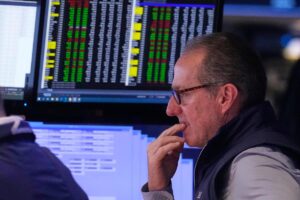Market Insights: Stocks Rally on Positive Inflation Data
On Thursday, U.S. stock markets experienced a notable uptick, buoyed by favorable news surrounding inflation trends. The S&P 500 edged up by 0.4%, now just 1.6% shy of its all-time high, signaling renewed investor optimism. Meanwhile, the Dow Jones Industrial Average gained 101 points (0.2%), and the Nasdaq Composite mirrored this upward trajectory, also rising by 0.2%.
Oracle Steals the Spotlight
One pivotal player in this market ascent was Oracle, whose shares surged by an impressive 13.3%. The tech titan reported quarterly profits and revenues that surpassed analysts’ expectations. CEO Safra Catz even forecasted “dramatically higher” revenue growth for the upcoming fiscal year—news that undoubtedly sparked investor enthusiasm and contributed to the overall market rally.
Conversely, Boeing faced turbulence, with shares declining by 4.8% after an Air India flight operated by the company’s 787 Dreamliner reportedly crashed shortly after takeoff, resulting in significant concern and uncertainty.
Inflation and Treasury Yields: A Double-Edged Sword
The broader stock rally received a boost from easing Treasury yields in the bond market. Recent inflation data indicated that wholesale prices rose less than anticipated last month, supporting an earlier report detailing similar consumer sentiments. This trend is encouraging for investors who view it as a potential signal for the Federal Reserve to adopt a more accommodative monetary policy, possibly opening the door for interest rate cuts later in the year.
The Fed has been cautious about lowering rates, primarily due to uncertainties surrounding trade tariffs imposed by the previous administration. While historically, lower interest rates have stimulated economic growth, they can also exacerbate inflation—an ongoing balancing act for policymakers.
Jobless Claims: A Harbinger of Economic Health?
In addition to the inflation data, a report on jobless claims presented a mixed picture: slightly more Americans than expected sought unemployment benefits last week, pushing total claims to their highest levels in eight months. This development could signal a rise in layoffs, warranting close attention from market watchers and policymakers alike. According to Macquarie strategist Thierry Wizman, the Fed might have resumed interest rate cuts if not for the tariff uncertainty.
With the Fed’s next interest rate meeting scheduled for next week, market expectations remain that no changes will be made. However, many traders are betting on potential cuts by September, which could further sway market dynamics.
Trade Tariffs: The Lingering Shadow
Uncertainties surrounding the Trump-era tariffs have introduced a layer of concerns about inflation and recession potential. The S&P 500 had previously dropped nearly 20% due to these fears, but recent hopes for potential tariff reductions following trade negotiations have helped rally investor sentiment. Nevertheless, Trump’s recent comments about imposing stringent trade measures add to the mix of uncertainty.
Noteworthy Movements in Technology
In other stock news, Chime Financial made a splash with a remarkable 37.4% jump on its Nasdaq debut. The company aims to become a comprehensive financial hub, connecting users with banking partners seamlessly.
On the flip side, GameStop witnessed a steep decline, losing 22.5% after announcing plans to raise $1.75 billion through a zero-interest borrowing strategy—a move that could result in lenders opting for equity repayments over cash.
Global Market Overview
As markets around the globe exhibited mixed results, Hong Kong’s Hang Seng Index stumbled by 1.4%, erasing some recent gains. Notably, the index has still managed to achieve nearly a 20% rise year-to-date, eclipsing the U.S. stock market’s comparatively modest growth of less than 3%.
In summary, the intertwining factors of inflation, corporate performance, jobless claims, and geopolitical uncertainties continue to shape market dynamics. Investors should remain vigilant, as these indicators can give valuable insights into potential shifts in economic policy and market responses.

